 Pope Francis touched down at Ankara airport today to begin his three-day pastoral journey to Turkey. The Holy Father was invited to the cities of Ankara and Istanbul by the Turkish government and the Ecumenical Patriarch Bartholomew I, who is spiritual leader to 300 million Orthodox Christians. The Pontiff’s first address was to the civil authorities:
Pope Francis touched down at Ankara airport today to begin his three-day pastoral journey to Turkey. The Holy Father was invited to the cities of Ankara and Istanbul by the Turkish government and the Ecumenical Patriarch Bartholomew I, who is spiritual leader to 300 million Orthodox Christians. The Pontiff’s first address was to the civil authorities:
Mr President
Mr Prime Minister,
Distinguished Authorities,
Ladies and Gentlemen,
I am pleased to visit your country so rich in natural beauty and history, and filled with vestiges of ancient civilizations. It is a natural bridge between two continents and diverse cultures. This land is precious to every Christian for being the birthplace of Saint Paul, who founded various Christian communities here, and for hosting the first seven Councils of the Church. It is also renowned for the site near Ephesus, which a venerable tradition holds to be the Home of Mary, the place where the Mother of Jesus lived for some years. It is now a place of devotion for innumerable pilgrims from all over the world, not only for Christians, but also for Muslims.
Yet, the reasons why Turkey is held with such regard and appreciation are not only linked to its past and ancient monuments, but also have to do with the vitality of its present, the hard work and generosity of its people, and its role in the concert of nations.
It brings me great joy to have this opportunity to pursue with you a dialogue of friendship, esteem and respect, in the footsteps of my predecessors Blessed Paul VI, Saint John Paul II, and Benedict XVI. This dialogue was prepared for and supported by the work of the then Apostolic Delegate, Angelo Giuseppe Roncalli, who went on to become Saint John XXIII, and by the Second Vatican Council.
Today what is needed is a dialogue which can deepen the understanding and appreciation of the many things which we hold in common. Such a dialogue will allow us to reflect sensibly and serenely on our differences, and to learn from them.
There is a need to move forward patiently in the task of building a lasting peace, one founded on respect for the fundamental rights and duties rooted in the dignity of each person. In this way, we can overcome prejudices and unwarranted fears, leaving room for respect, encounter, and the release of more positive energies for the good of all.
To this end, it is essential that all citizens, Muslim, Jewish, and Christian, both in the provision and practice of the law, enjoy the same rights and respect the same duties. They will then find it easier to see each other as brothers and sisters who are travelling the same path, seeking always to reject misunderstandings while promoting cooperation and concord. Freedom of religion and freedom of expression, when truly guaranteed to each person, will help friendship to flourish and thus become an eloquent sign of peace.
The Middle East, Europe and the world all await this maturing of friendship. The Middle East, in particular, has for too long been a theatre of fratricidal wars, one born of the other, as if the only possible response to war and violence must be new wars and further acts of violence.
How much longer must the Middle East suffer the consequences of this lack of peace? We must not resign ourselves to ongoing conflicts as if the situation can never change for the better! With the help of God, we can and we must renew the courage of peace! Such courage will lead to a just, patient and determined use of all available means of negotiation, and in this way achieve the concrete goals of peace and sustainable development.
Mr President, interreligious and intercultural dialogue can make an important contribution to attaining this lofty and urgent goal, so that there will be an end to all forms of fundamentalism and terrorism which gravely demean the dignity of every man and woman and exploit religion.
Fanaticism and fundamentalism, as well as irrational fears which foster misunderstanding and discrimination, need to be countered by the solidarity of all believers. This solidarity must rest on the following pillars: respect for human life and for religious freedom, that is the freedom to worship and to live according to the moral teachings of ones religion; commitment to ensuring what each person requires for a dignified life; and care for the natural environment. The peoples and the states of the Middle East stand in urgent need of such solidarity, so that they can reverse the trend and successfully advance a peace process, repudiating war and violence and pursuing dialogue, the rule of law, and justice.
Sadly, to date, we are still witnessing grave conflicts. In Syria and Iraq, particularly, terrorist violence shows no signs of abating. Prisoners and entire ethnic populations are experiencing the violation of the most basic humanitarian laws. Grave persecutions have taken place in the past and still continue today to the detriment of minorities, especially, though not only, Christians and Yazidis. Hundreds of thousands of persons have been forced to abandon their homes and countries in order to survive and remain faithful to their religious beliefs.
Turkey, which has generously welcomed a great number of refugees, is directly affected by this tragic situation on its borders; the international community has the moral obligation to assist Turkey in taking care of these refugees. In addition to providing much needed assistance and humanitarian aid, we cannot remain indifferent to the causes of these tragedies. In reaffirming that it is licit, while always respecting international law, to stop an unjust aggressor, I wish to reiterate, moreover, that the problem cannot be resolved solely through a military response.
What is required is a concerted commitment on the part of all, based on mutual trust, which can pave the way to lasting peace, and enable resources to be directed, not to weaponry, but to the other noble battles worthy of man: the fight against hunger and sickness, the promotion of sustainable development and the protection of creation, and the relief of the many forms of poverty and marginalization of which there is no shortage in the world today.
Turkey, by virtue of its history, geographical position and regional influence, has a great responsibility: the choices which Turkey makes and its example are especially significant and can be of considerable help in promoting an encounter of civilizations and in identifying viable paths of peace and authentic progress.
May the Most High bless and protect Turkey, and help the nation to be a strong and fervent peacemaker!
(Note: Thanks to Fr Tom Rosica from the Holy See’s press office for the English translation.)



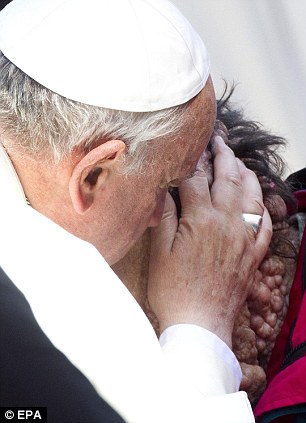 Today’s Gospel reading (Luke 5:12-16) features Jesus reaching out to touch and heal a leper, who was outcast in the society of his day because of his disfiguring illness. For me, this reading immediately brought to mind Pope Francis’ embrace of a severely disfigured man at the Vatican some months ago, which brought tears to the eyes of even the most jaded Vatican observers. This, in turn, evoked the Pontiff’s namesake, St Francis of Assisi, who famously kissed a person stricken with leprosy in his day.
Today’s Gospel reading (Luke 5:12-16) features Jesus reaching out to touch and heal a leper, who was outcast in the society of his day because of his disfiguring illness. For me, this reading immediately brought to mind Pope Francis’ embrace of a severely disfigured man at the Vatican some months ago, which brought tears to the eyes of even the most jaded Vatican observers. This, in turn, evoked the Pontiff’s namesake, St Francis of Assisi, who famously kissed a person stricken with leprosy in his day.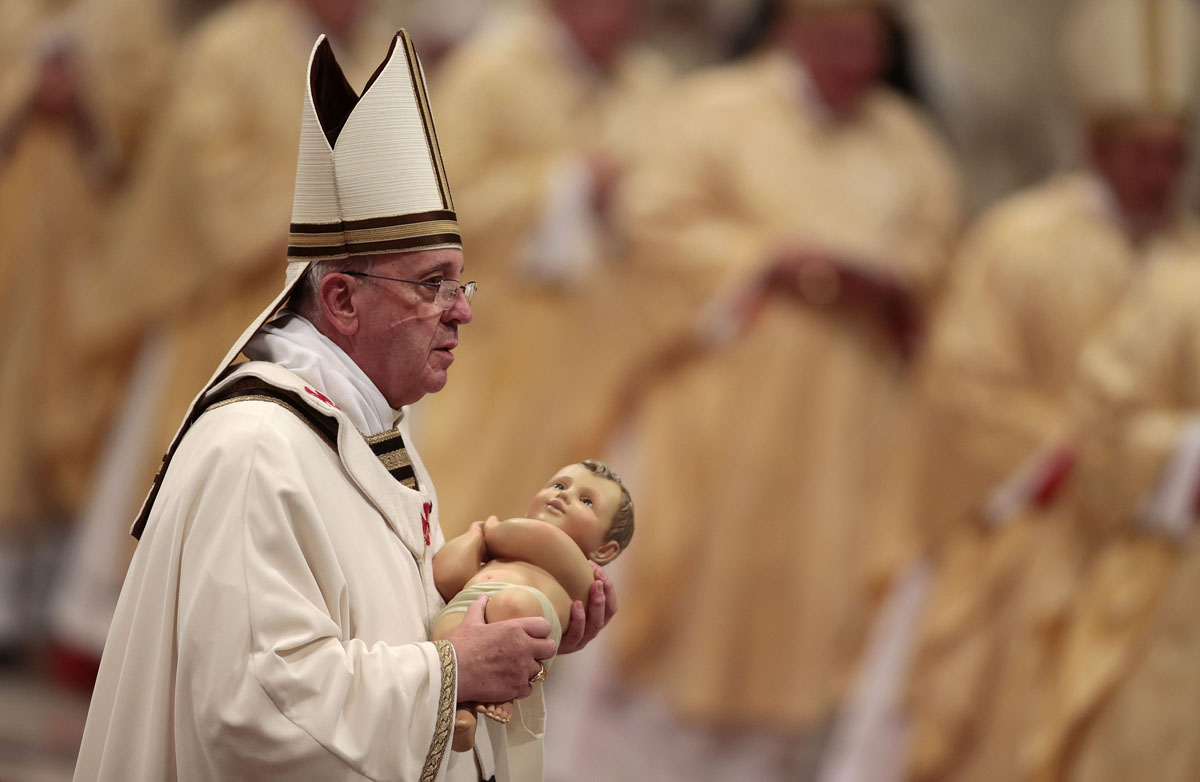
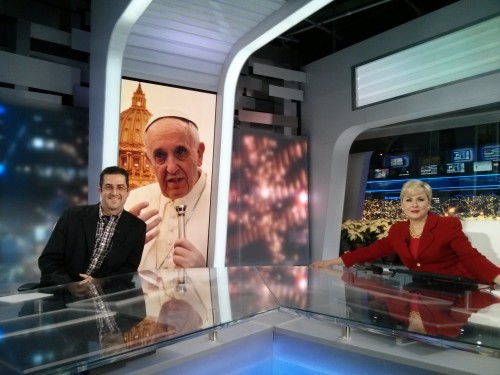 CTV News interviewed me about Pope Francis’ Christmas message to the Roman Curia (essentially those Church officials responsible for the internal functioning of key Vatican departments). Since my entire live interview on CTV News Channel with Jennifer Ward was not posted online (a brief, out of context clip appeared on the nightly National News broadcast with Lisa LaFlamme), I’m going to summarize my key points below. There has been a great deal of interest surrounding what the Pontiff said, which many have interpreted as a “stinging rebuke” by the Holy Father, that was “received coldly” by his audience. Is that really the case?
CTV News interviewed me about Pope Francis’ Christmas message to the Roman Curia (essentially those Church officials responsible for the internal functioning of key Vatican departments). Since my entire live interview on CTV News Channel with Jennifer Ward was not posted online (a brief, out of context clip appeared on the nightly National News broadcast with Lisa LaFlamme), I’m going to summarize my key points below. There has been a great deal of interest surrounding what the Pontiff said, which many have interpreted as a “stinging rebuke” by the Holy Father, that was “received coldly” by his audience. Is that really the case? Pope Francis touched down at Ankara airport today to begin his three-day pastoral journey to Turkey. The Holy Father was invited to the cities of Ankara and Istanbul by the Turkish government and the Ecumenical Patriarch Bartholomew I, who is spiritual leader to 300 million Orthodox Christians. The Pontiff’s
Pope Francis touched down at Ankara airport today to begin his three-day pastoral journey to Turkey. The Holy Father was invited to the cities of Ankara and Istanbul by the Turkish government and the Ecumenical Patriarch Bartholomew I, who is spiritual leader to 300 million Orthodox Christians. The Pontiff’s 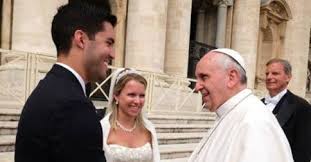 Q. I have heard many pundits from the MSM (mainstream media) declare that Pope Francis wants to redefine marriage. Is this true?
Q. I have heard many pundits from the MSM (mainstream media) declare that Pope Francis wants to redefine marriage. Is this true?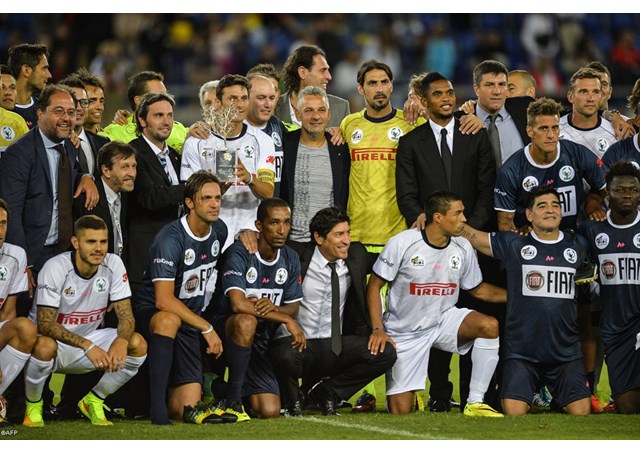 Yes, that Diego Maradona, he of the infamous “Hand of God” goal in the ’86 World Cup. Maradona was in Rome Monday night not simply to see his fellow Argentine Pope Francis, but to play, along with other futbol luminaries Javier Zanetti and Roberto Baggio, in a unique event billed as an “Interreligious Match for Peace”. Zanetti indicated that the “friendly”, played in front of a huge crowd at Rome’s Olympic stadium, was the “express wish of Pope Francis” who wanted to show the power of sport for building bridges of peace.
Yes, that Diego Maradona, he of the infamous “Hand of God” goal in the ’86 World Cup. Maradona was in Rome Monday night not simply to see his fellow Argentine Pope Francis, but to play, along with other futbol luminaries Javier Zanetti and Roberto Baggio, in a unique event billed as an “Interreligious Match for Peace”. Zanetti indicated that the “friendly”, played in front of a huge crowd at Rome’s Olympic stadium, was the “express wish of Pope Francis” who wanted to show the power of sport for building bridges of peace.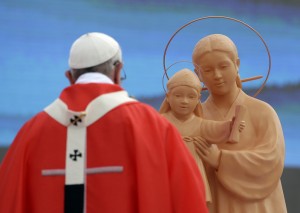 The Holy Father highlights the need for reconciliation, which is of particular concern for the future of the Korean peninsula.
The Holy Father highlights the need for reconciliation, which is of particular concern for the future of the Korean peninsula.
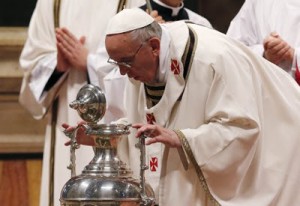 HOMILY OF POPE FRANCIS
HOMILY OF POPE FRANCIS